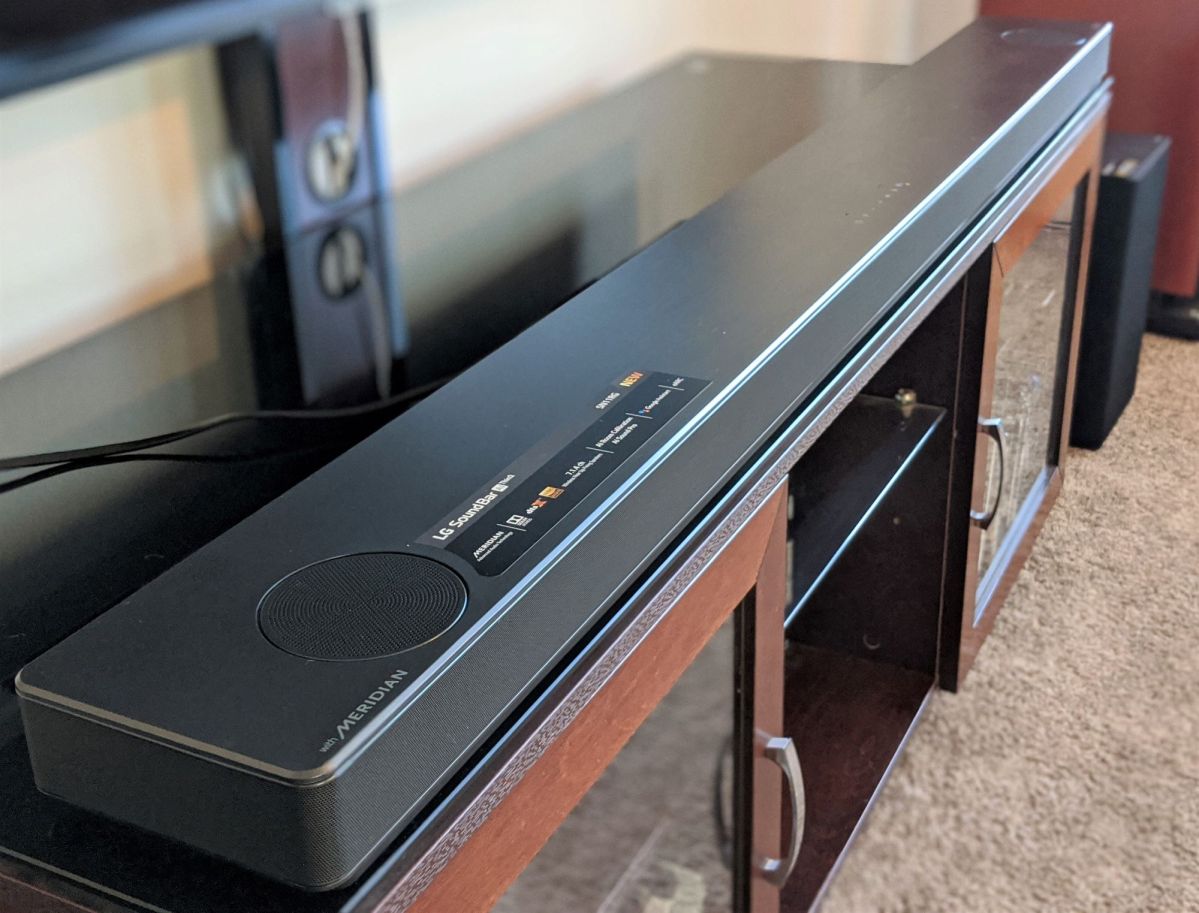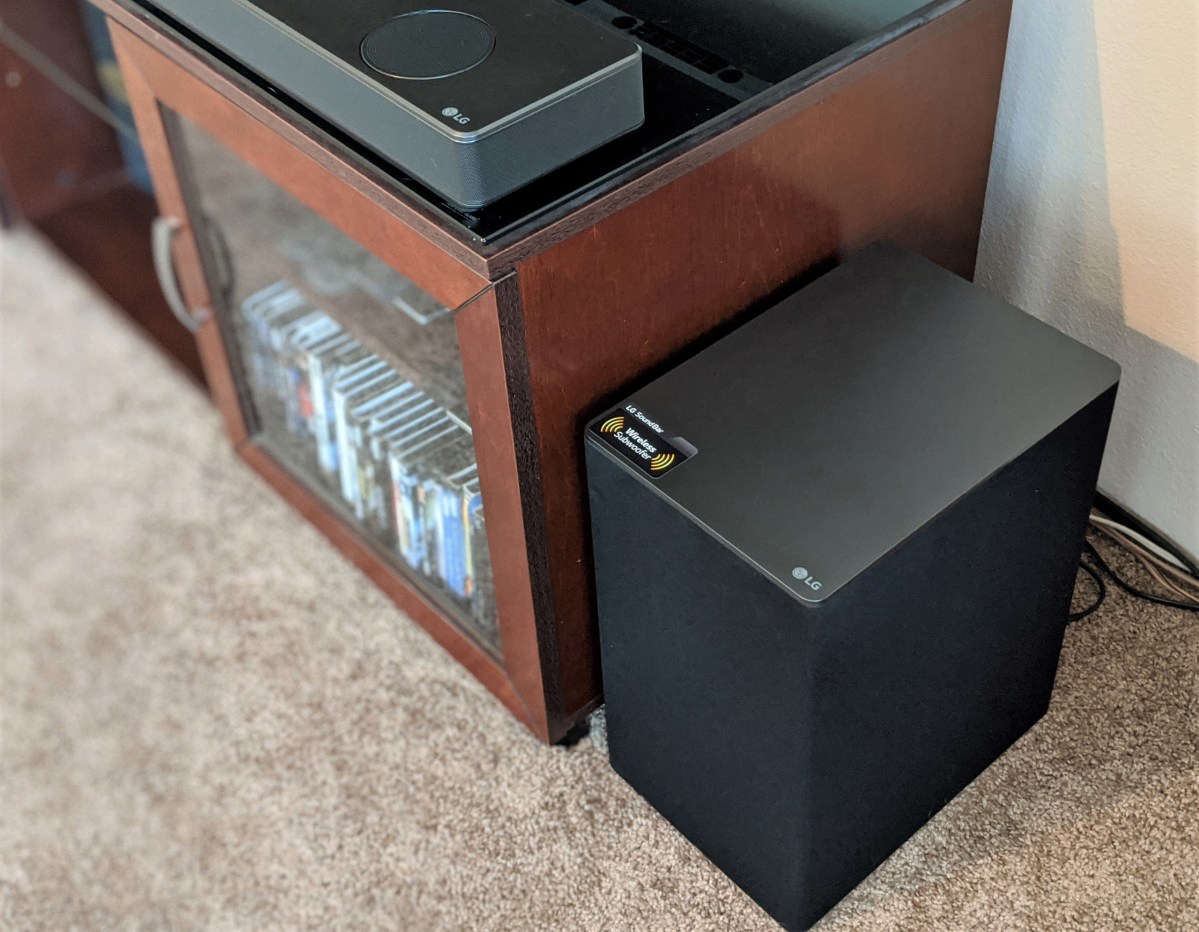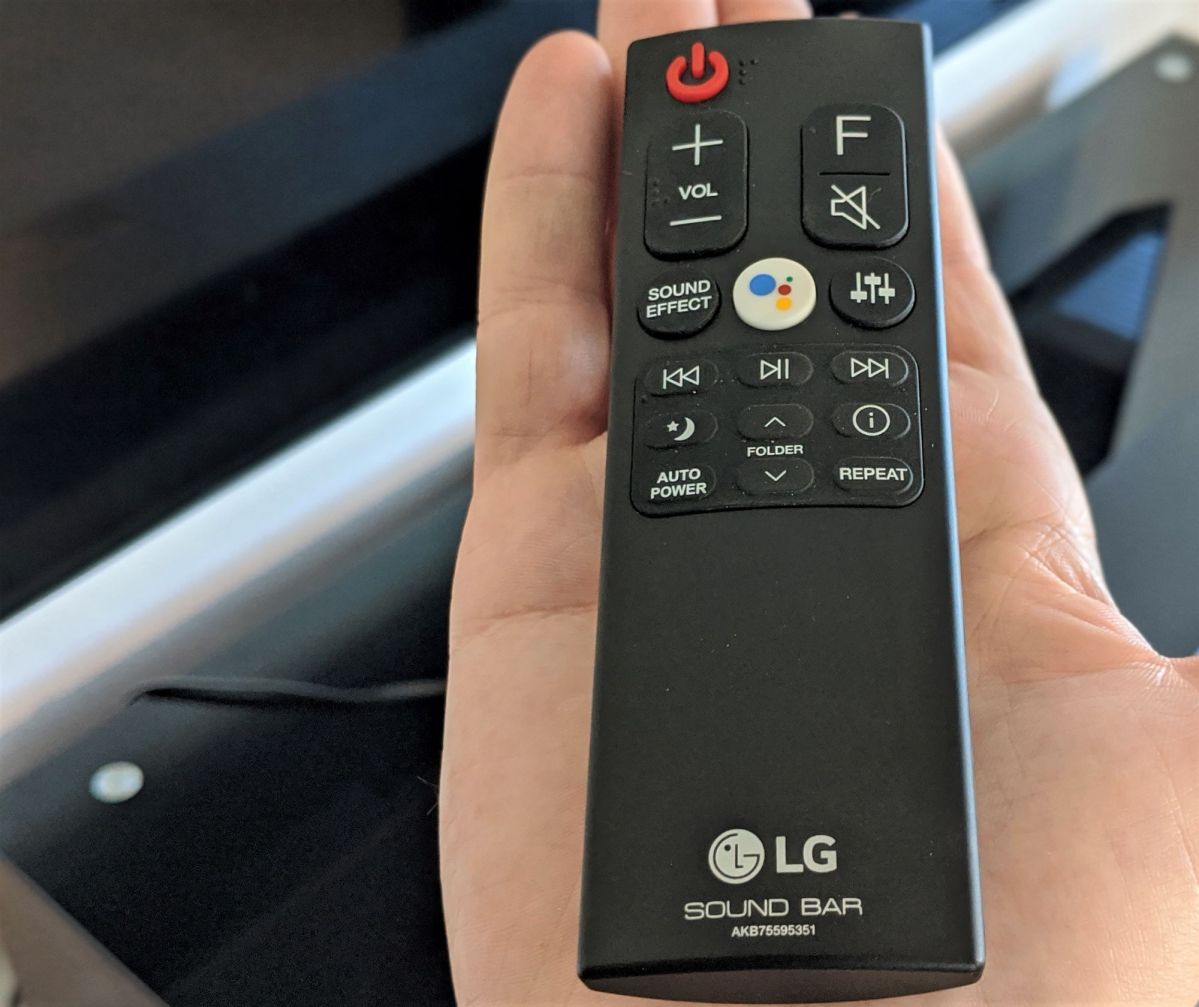- Simple set up
- Sleek design
- Immersive audio experience
- Handy Google Assistant
- Lacks inputs
- Expensive
In building one of the best soundbars, LG went full John Hammond from Jurassic Park on us. That is, they spared no expense.
LG’s new SN11RG soundbar is a full-fledged 7.1.4 system featuring Hi-Res audio and Dolby Atmos support, plus other luxuries like built-in Google Assistant and HDMI eARC. It’s also $1,600. Let’s find out if this bar’s wealth of features balance out its price tag.
Design
First thing’s first. The SN11RG is, for lack of a more apt word, long. At nearly 57 inches wide, it’s nine inches bigger the Samsung HW-Q90R, which is no pipsqueak itself. In other words, you’ll want to make sure you have a media stand that can accommodate this big bar. It’s thin at 2.5 inches, and not overly heavy at 15.9 pounds, but the sheer width of the bar did make for a small annoyance when moving it to access the rear connections.

Big isn’t all bad, though, especially when the bar is as sleek and extravagant as the SN11RG. You don’t necessarily want your soundbar to upstage your actual display, and if you’re someone that’s in the market for a setup like this, that’s likely not a concern. But when you’re, say, a reviewer pairing the bar with a lower-end 4K TV, the difference in aesthetics is palpable.
The front panel features a series of controls that includes a power button, a function select button, volume and playback controls, and a pair of buttons for interacting with the soundbar’s built-in Google Assistant support. They’re handy to have directly on the bar in a pinch, but I primarily used the accompanying remote or mobile app, which I’ll get to momentarily.
The wireless rear speakers and subwoofer that round out the system are encased in substantial black cabinets, dwarfing the satellites and woofers from the Vizio 5.1 system I had auditioned previously. They’re right in the ballpark, however, when compared to their more direct competitors. You’ll still be able to tuck this sub away without much hassle, and finding resting spots for the rear speakers wasn’t an issue.
LG is relatively limited on specs for the actual drivers in the system. The soundbar, of course, has up-firing drivers to add front height channels, while the rear speakers have been outfitted with up-firing drivers to re-create the rear heights.
Setup
A key selling point of most soundbar systems is the ability to set up the entire ensemble far more economically than a traditional home theater system. With the absence of things like A/V receivers and lengthy runs of speaker wire, soundbars are generally more approachable to the ordinary listener in terms of getting them up and running.

LG took that rule of thumb and streamlined it. Getting your SN11RG up and running begins with a three-step process that fits within the constraints of an index card: Plug the soundbar into power, download the Google Home App, and set up your Wi-Fi connection. From there, you’re free to stream music as you set up the rest of the system.
The rest of the process is just as simple. You’ll need a connection between the soundbar and TV, and LG gives you HDMI and optical audio options. Either will work, but be aware that optical audio connections do not support Dolby Atmos. Going that route will limit you to standard surround sound.
Both the subwoofer and rear speakers are designed to automatically connect to the soundbar when plugged into power, though LG has a fail-safe laid out in its manual if for some reason that doesn’t happen. All told, after taking the time to carefully unbox the individually wrapped components, I had the whole system connected in less than 10 minutes.
To me, the best perk of the setup process is that the rear speakers don’t have to be tethered to the subwoofer by wires, a common theme in other systems I’ve dealt with. This frees the subwoofer to be placed wherever it sounds best in your listening space, as opposed to being relegated to the back of the room with the surrounds. You can even do the classic sub crawl, where you place the sub in your normal listening position and literally crawl around the room to determine where it will be able to perform best.
The same goes for the rear speakers, though they are somewhat limited by short power cables (5 feet). It wasn’t a problem for me, but just know that you’ll need an outlet or two nearby.
LG also includes wall mount brackets for both the soundbar and the rear speakers, which is a sweet addition. For the purposes of this review, however, I didn’t touch them.
The “LG Wi-FI Speaker” app is an important final piece to the setup puzzle. It doesn’t just serve as an extra remote if you’ve lost yours — or if it’s sitting on your coffee table, and you’re too comfy/lazy to reach for it. It’s also your ticket to running LG’s A.I. room calibration feature, which measures the acoustics of the room and tunes your system accordingly. I’ll have more on that later.
Connections
Connection will be a problem for some, as the SN11RG comes with just a pair of HDMI HDCP 2.3 inputs. The home theater-minded consumer these days has multiple devices to connect, including everything from 4K Blu-ray players to streaming devices like Rokus or Apple TVs, as well as gaming consoles like a Nintendo Switch, meaning two HDMI inputs just doesn’t seem adequate for a soundbar that will certainly be a burden on your wallet.

Now, this can be handily remedied if your TV has multiple available HDMI ports. But if, for some reason, you have an older model (i.e., a 2017 Sony 65-inch 850E series display) that doesn’t support Dolby Atmos playback, your only workaround is to connect your devices directly to the soundbar, and run a cable from the soundbar’s HDMI eARC output to your TV. In that case, the limited number of inputs becomes a painful obstacle.
For reference, my personal Marantz SR5012 A/V receiver has seven HDMI inputs and retailed for $1,000 when it first hit the market. Granted, these are very different devices, and it’s not realistic to expect a soundbar to have seven inputs. But the modern soundbar, especially one that costs $1,600, should be able to meet those connectivity needs in a similar fashion.
There’s also a USB port and an optical in on the back of the SN11RG, though, as I’ve cautioned before, you won’t get Dolby Atmos playback by using optical. That type of connection just can’t handle the volume of data in more advanced audio formats, meaning you’ll be limited to more basic surround sound formats like Dolby Digital 5.1.
Smart features
Google plays a big part in the smart capabilities of the SN11RG, with both Google Assistant and Google Chromecast built in.

Being the smart assistant junkie that I am, I used Google Assistant most often, with some satisfying results. Getting home and quickly immersed in music was as simple as asking Google to do so, and changing tracks while tunes were being pumped through the soundbar was just as painless. The microphones built into the soundbar did a solid job of picking up my voice even when music was playing.
Even with my normal home theater setup rigged to my liking, there’s still a couple of steps I have to take before I can command my Amazon Echo Dot to begin playback on my receiver. Using the SN11RG’s built-in assistant was far more instantaneous, which is kind of the goal here.
If you are tired of repeating the Google Assistant wake words, there is a button on both the remote and soundbar itself designed to summon it. The soundbar also supports Group Play Mode through Chromecast, though I, unfortunately, lacked the additional Chromecast-enabled speakers to give it a shot. The work-from-home life does have a few shortcomings, after all.
Sound quality
If ease of setup and sleek design were LG’s raptors and omnivores, then audio quality is the main attraction. It’s the Tyrannosaurus Rex if you’ll allow me to continue the references to a 27-year-old movie, and LG sure gave it a lot of teeth to show off.

It’s not just Dolby Atmos and DTS:X support — or the vast amount of other supported audio formats — though they are prominent. It’s the partnership with Meridian Technology, the 24-bit/192kHz audio resolution support, the Bluetooth 5.0 tech, or even LG’s AI Sound Pro hardware. Suffice it to say, LG has left no stone unturned in the pursuit of making this soundbar system an absolute audio juggernaut.
After three weeks of tossing all different types of content at it, I can say this about the SN11RG: In the world of soundbars, it is that juggernaut.
Music playback rendered the kind of crisp, detailed sound you would hope for in a bar this expensive. It’s the home theater realm, though, where the SN11RG really gets to strut its stuff, especially when it comes to Atmos.
Auditioning selections from a Dolby Atmos demo disc was an immersive experience that showed me LG’s up-firing drivers were no gimmick. There’s also a hidden demo mode spotted by an early adopter, where pressing “F” on the main unit for 5 seconds brings up the same pair of demo tracks. These short clips only made me want something more substantive, however, so I went browsing through our top Dolby Atmos picks.
I started with Avengers: Infinity War, and I could very well have called it then and there. Minutes into the movie, when Hulk came hurtling down to Earth and thunderously crashed into the Sanctum Sanctorum, I heard everything I needed to know. It’s an immersive, fun experience watching movies with the SN11RG running the show audio-wise, to the point where I would have looked for a Banner-sized hole in my ceiling if I didn’t know any better. The subwoofer packs a considerable punch as a worthy sidekick to the bar itself, and the rear speakers effectively envelop you in each scene.
I said earlier that I would get back to the A.I. room calibration, and here we are. Paired with LG’s AI Sound Pro, which the company says uses adaptive sound control to automatically match the audio with the content, it creates a stellar sound for the set-it-and-leave-it types. If, like me, you prefer to tinker with the sound, LG allows for that too. There are different sound effects for content like movies and music, with the option to adjust the levels of each individual part of the system.
The app also has toggle options for modes like Night Time (softens bigger sounds, boosts dialogue), or Neural:X, which matches content to the appropriate channels. There’s even an AV Sync option meant to dissipate any breaks in continuity between the audio and video.
Putting the sound in context
There is a caveat, however, one that may be a little unpopular in soundbar enthusiast circles. For as much technology and features as companies can fit into soundbars these days, there is a point of diminishing returns. And it feels like LG may have reached it.

Having the ability to test this soundbar against a comparably priced home theater system reveals as much. As enjoyable as the sound from LG’s SN11RG is, it’s always going to be capped by the limitations of its design. It falls short of a soundstage with true left and right separation, the fullness of floor-standing speakers, or the resonating low end of a beefy home theater sub. As much as LG can try to virtually replicate that sound – and believe me, it is trying – it’s just not going to be the real deal.
Maybe you think that’s unfair to LG, and maybe you’re right. LG seems to be making this soundbar for a very specific group of consumers, and to be clear, that group will be thrilled with its performance. But boil it all down, and you’re paying nearly $2,000 for audio. Categorized as a soundbar, it’s objectively great sound. But open the floor to other options, and frankly, there are better ways to spend this kind of money. Your decision will come down to what your home theater room will support, and whether you’re willing to hassle with the installation of a home theater setup that has multiple surround speakers.
Our take
The LG SN11RG packs cinematic performance into the footprint of a soundbar, but it comes at the hefty price of a complete home theater package.
Is there a better alternative?
The $1,700 Samsung HW-Q90R will likely come as close to matching the LG in performance as it does in price. If you’re looking for even more minimalism without sacrificing quality, the $2,500 Sennheiser Ambeo could be an option. Just not a cheap one.
For a Dolby Atmos soundbar that saves you a few bucks, Vizio’s 5.1.4 system comes in at $1,000.
How long will it last?
The build quality on the LG SN11RG is exceptional, and the hardware is no slouch either. This bar should last for many movie nights to come.
Should you buy it?
Yes. It’s a tall price to pay for sound, and you could build a better system with that kind of coin. But for anyone who is looking for great performance in a soundbar and is willing to pay for it, the LG SN11RG makes the shortlist of premium options.
If the price is your main concern, you can also consider some of the best soundbar deals available now.





